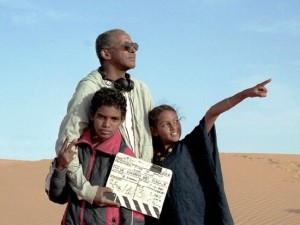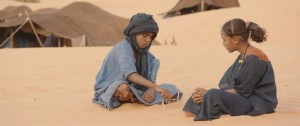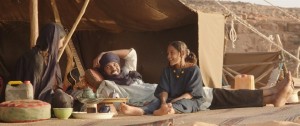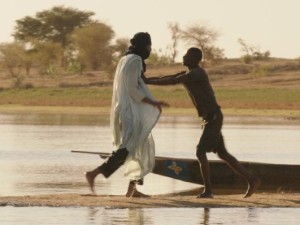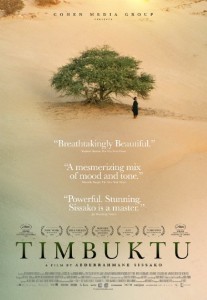Timbuktu **** (2014, Ibrahim Ahmed, Abel Jafri, Toulou Kiki) – Movie Review
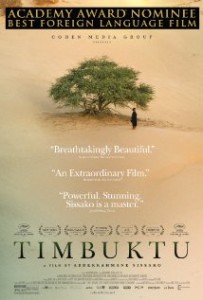
Director Abderrahmane Sissako’s Timbuktu is important, worthy, really well made, and visually extremely striking. But it’s a deeply depressing and disturbing story, and quite difficult to take and hard going. Its very considerable worth was noted in its 2015 Oscar nomination as Best Foreign Language Film of the Year.
Near Timbuktu, proud cattle herder Kidane (Ibrahim Ahmed) lives peacefully in the dunes with his wife Satima (Toulou Kiki), his daughter Toya (Layla Walet Mohamed), and Issan (Mehdi Mohamed), their 12-year-old shepherd.
In town, the people suffer from a regime of terror imposed by the Jihadists determined to control their faith, banning music, laughter, cigarettes and soccer. Kidane and his family are being spared the control of the Jihadists but that changes abruptly and shockingly.
The film is a beautifully handled, considerable work of art, as well as a vehicle for a strong, anti-extremist message. But it is hard to sit through, and unfortunately it would be even harder to contemplate a second viewing, which it rightly deserves.
It is breathtakingly beautiful, but that’s not really the point. It’s a denunciation of intolerance and extremist religion. and that’s really the point. As such, it’s an extremely powerful statement and an agonising film.
At Cannes in 2014, it was nominated for the Palme d’Or, but had to be content with winning the Prize of the Ecumenical Jury. They said: ‘This film tells the story of the life and dignified resistance of men and women in Timbuktu who seek to live according to their culture and traditions while at the same time integrating modern communication media. The film is a strong yet nuanced denunciation of an extremist interpretation of religion.
‘The Ecumenical Jury Prize honours the film’s high artistic achievement and its humour and restraint. While offering a critique of intolerance, the film draws attention to the humanity inherent in each person.’
© Derek Winnert 2015 Movie Review
Check out more reviews on http://derekwinnert.com

